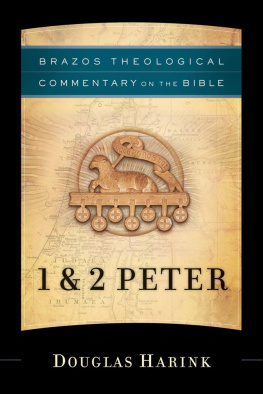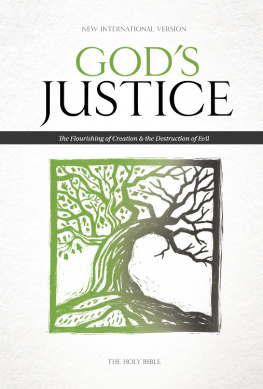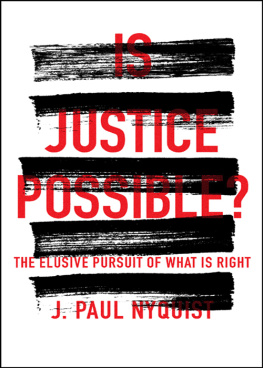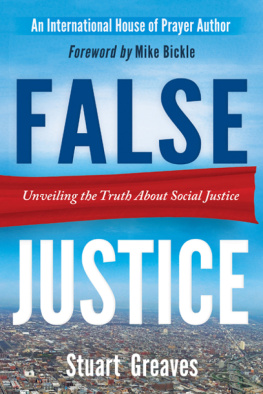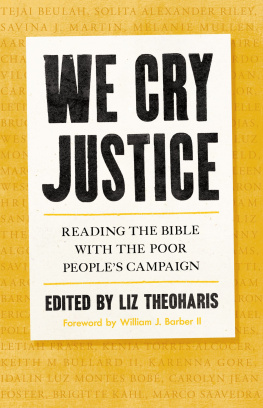All rights reserved. No part of this book may be reproduced in any form without written permission from InterVarsity Press.
Scripture quotations, unless otherwise noted, are the authors own translation.
The publisher can't verify the accuracy of website hyperlinks beyond the date of print publication.
PREFACE
JUSTICE IS EVERY CHRISTIANS CONCERN. There is no avoiding it, since the theme of justice pervades the Bible from Genesis to Revelation. Justice is Gods concern.
The trouble is that Christians often disagree about what justice means, whether in the Bible or in contemporary society. Christians also disagree about how they should be for justice, and what kind of justice they should be promoting and advancing. For example, among North American Christians, some groups think of justice primarily in terms of retributions and punishments for transgressions and crimes committed. They emphasize law and order, and often advocate for harsher penalties for crimes, including the death penalty. Other groups think of justice primarily as social justice, as equity and fairness in the social and economic spheres of life. Among other things, they advocate for better wages and working conditions, and for less disparity between the rich and the poor. While it is not impossible to hold both of these understandings of justice, often these groups are at odds with one another; to be for justice means quite different things to each group.
Christians will naturally turn to the Bible to ground and clarify their understandings of justice. They will discover (if they do not already know) that there is a lot of material on the theme in the Old Testament, especially in the books of the Law (Exodus to Deuteronomy) and the Prophets. Any good study of the biblical idea(s) of justice will spend a great deal of time on this material and will find it rich in dimension and nuance. Just about every aspect of justice is found there: trial and judgment, transgression and penalty, crime and punishment, equity and fairness, judgment against greed and cruelty, protection for the poor and vulnerable, and so on. There is also much about the relation between divine and human justice, and between justice and mercy.
Christians are less inclined to turn to the New Testament to shape their ideas of justice. In the Gospels, Jesus seems to be more concerned about challenging some Old Testament forms of justice than about upholding them. In fact, his teachings on justicefor example, in the Sermon on the Mount (Mt 57)seem extreme and unrealistic, lacking the attention to intent, circumstance, and context that we find in the laws of Moses. Most Christians think of Jesus teachings as representing a kind of ideal, setting before us something to strive toward, but nevertheless unattainable in the practicalities of day-to-day life and society. Understanding Jesus teachings on justice as nice but unrealistic ideals is disputed by many recent studies of the Gospels, but it continues to make sense to the majority of Christians in our time.
When it comes to the rest of the New Testament, it seems there is very little discussion of justice at all. Perhaps the letter of James is an exception. As for the letters of Paul, well (so the thinking goes), there is next to nothing on the theme.
It is that last thought, on Paul, that I aim to challenge in this book on Romans. For I will argue that Romans is centrally concerned about justice. In this letter Paul asks us to think about justice a lot and to think about it differently, since the life, death, resurrection, and exaltation of Jesus makes all the difference in our thinking about justice. Therefore Romans demands our attention as the key New Testament document on justice, which not only makes its own claim about the theme but also requires us to receive the Old Testament understanding of justice in a new way. In this book I aim to think along with Paul, and I invite you, the reader, to think along with Paul and me about this most important of themes. For that reason, scattered liberally throughout the chapters of this book you will find textboxes in which I invite you to reflect on questions related to the dimensions and themes of justice in Romans. I urge youor better, a group of youto think about and discuss these questions in order to relate what Paul writes to your own contexts, thoughts, and practices. These questions will often be existentially and intellectually demanding, asking you to reflect deeply on your own commitments and ideas, and on many of the ideas, institutions, and practices we take for granted in our societies and nations. Romans demands nothing less than a fundamental rethinking of all things in the light of the gospela renewing of the mind that is not conformed to this world but transformed by the reality of God, the Father, Son, and Holy Spirit (Rom 12:1-2). In this way, and with some guidance from me, I hope you will be the one to make the connections between what Paul writes about justice in Romans and your own life in the world.
This book is best understood as a reading of Romans. It is not a technical commentary on all the words and phrases in the letter (there are many such commentaries, and their number increases every year) but an attempt to follow Paul as he thinks justice in relation to Jesus. A reading of Romans is more fluid and more adventurous than a technical commentary, less intent on emphasizing the detailed linguistic and historical issues in interpretation, and more intent on attending to how the text shapes our contemporary understanding. A reading also leaves more loose ends (for example, on some important Christian doctrines) than scholarly commentaries usually do. I do not try to deal with every text and the issues they might raise but with those texts that (in my judgment) have most to contribute to our understanding of justice. That all said, I have been engaged in the study of Paul and Romans for many years, and have been deeply instructed and formed by numerous scholarly books and commentaries on Paul, Romans, and justice. Should you, the reader, wish to follow up on what you read in this book, I have provided at the end of the book suggestions for further reading. For readers who may already be familiar with some or much of the scholarship on Paul and Romans, the scholarly influences on my work may be detected on nearly every page. Indeed, if you are a Paul scholar, you may recognize your own influence here! Yet, I have not documented everything (or even very much) in footnotes, in order not to distract the readers for whom this book is primarily writtenordinary, thinking Christians who want a deeper, gospel-informed understanding of biblical justice.
I must at least acknowledge several scholars whose influences are prevalent throughout this book: first and foremost, J. Louis Martyn (of blessed memory), the foundational figure in the contemporary understanding of the apocalyptic Paul; Beverly Roberts Gaventa, whose many essays and articles on Romans (soon to bear fruit in a full-scale commentary) have guided me in many of my interpretations; John M. G. Barclay, whose peerless book,


